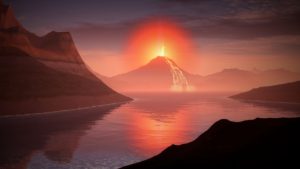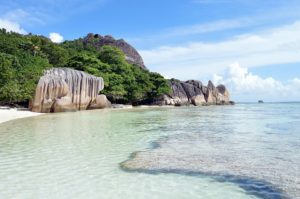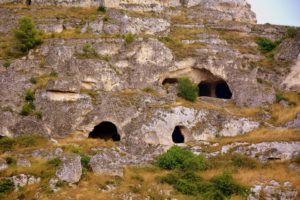Today I am interviewing Mizak Ckben (official Earth Department of Interstellar Affairs alliteration) from the planet Orozh. His form of address is Azha, similar to Minister in our language. He has communicated with me via interstellar ibeam technology that one of the other alien races has provided to us.
S: Azha Ckben, welcome.
C: Thank you.
S: Have any of your people traveled to Earth?
C: No, not yet. At present our planet is undergoing significant volcanic and tectonic upheaval, and we are occupied with efforts to protect our own people.
S: Is that a new development?
 C: It is significantly worse than normal for the last few centuries. Our planet goes through epoch cycles, and we are approximately twenty sun-orbits into the current epoch. Our volcanoes are normally active, but once each five thousand orbits, another planet in our system, Kitrong, reaches apogee in relation to Orozh, and it triggers an extreme level of activity. It is something we knew of well ahead of time and have prepared to deal with. We have relocated people and animals from the volatile areas to safer zones. We had built new towns and facilities in advance of the onset of increased problems. But there is still much work to do because of the greater concentration of population in certain areas.
C: It is significantly worse than normal for the last few centuries. Our planet goes through epoch cycles, and we are approximately twenty sun-orbits into the current epoch. Our volcanoes are normally active, but once each five thousand orbits, another planet in our system, Kitrong, reaches apogee in relation to Orozh, and it triggers an extreme level of activity. It is something we knew of well ahead of time and have prepared to deal with. We have relocated people and animals from the volatile areas to safer zones. We had built new towns and facilities in advance of the onset of increased problems. But there is still much work to do because of the greater concentration of population in certain areas.
S: Is your work directly related to that?
C: Yes. I am Azha of Relocation, responsible for housing, food and medical services. Even with our best efforts, there are injuries and illnesses related to the planet’s eruptions and tectonic shifts. New weakness develop in the planet’s crust with little warning sometimes, requiring quick action to move people out of the path of danger.
S: How do you identify areas that are about to erupt? Earth is still in the early stages of learning to identify when volcanoes will erupt. If your technology is more accurate, it would be very helpful.
C: Unfortunately, that knowledge is unique to each planet’s geography. Because our volcanoes rarely go dormant, as I understand yours often do, it has been easier for us to study them over a long period. We use a combination of infrared, what you call X-ray imaging, and dark-matter imaging to monitor the planet from orbiting satellites. However, there are some similarities between our planet and yours that will allow us to assist your scientists as we learn more about your planet.
S: Wonderful. So, in the areas where it is safe to live, what is your planet like? Is it hotter than Earth?
 C: Yes, of course, it is hotter than Earth in most areas. At the same time, in areas where there has been limited volcanic activity for the past one hundred sunors or so, lush vegetation has developed, much like the volcanic islands in your Pacific Ocean. However, like your Pacific islands, the land mass of each one is relatively small, so the populations are limited there. We have four main continents, one about the size of Asia, two about the size of South America, and one a little smaller than Antartica. Most of the rest of our landmass is scattered across the planet in smaller sub-continents and connected island chains. Orozh is smaller than Earth, but a total of seventy percent of our surface is land rather than water, so we have little open water in the form of oceans, but a number of smaller seas. During low tide on one side of the planet, you can walk between many of the islands that are separated during high tide.
C: Yes, of course, it is hotter than Earth in most areas. At the same time, in areas where there has been limited volcanic activity for the past one hundred sunors or so, lush vegetation has developed, much like the volcanic islands in your Pacific Ocean. However, like your Pacific islands, the land mass of each one is relatively small, so the populations are limited there. We have four main continents, one about the size of Asia, two about the size of South America, and one a little smaller than Antartica. Most of the rest of our landmass is scattered across the planet in smaller sub-continents and connected island chains. Orozh is smaller than Earth, but a total of seventy percent of our surface is land rather than water, so we have little open water in the form of oceans, but a number of smaller seas. During low tide on one side of the planet, you can walk between many of the islands that are separated during high tide.
S: That’s very interesting. I can imagine it would be fun to take a long hike during low tide.
C: (He laughs, a nasal sound). It would be a very long hike. The tide would be likely to catch you before you made it across.
S: Ah. Consider me warned. Guess I won’t try that after all. Since you have interstellar travel capability, have your people considered relocating to another, more hospitable planet?
C: We only developed interstellar travel technology within the last Orozh century. Finding a planet suitable for mass migration would be a long-term project, and the tectonic upheavals will subside long before we could complete a survey of nearby star systems. However, perhaps by the next time Kitrong reaches apogee, that will be an option.
S: Tell me about your family.
C: We have larger families than many Earthlings, and we have a relatively short lifespan compared to humans. I have seven children. Males live an average of fifty of your years, but our years are shorter. The mathematical formula used to compare our years to yours indicates our year is about two hundred twelve of your days. Our females live only about half as long as males, so the average male has two or three wives during his lifetime. My children are the offspring of two different wives.
S: It’s very emotionally stressful when humans lose a spouse, even when it’s by choice in a divorce. It must be very difficult to lose two or more during a lifetime.
C: We are not a very emotional species as you define it. We feel fear and some of the emotions related to survival, but not your softer ones like love and jealousy. We are attracted to our mates, and we remain monogamous while our spouse is alive. There is a sense of loss when a spouse dies, but we recover far more easily than humans.
And of course, we feel a strong protective instinct toward our children. Much of the rest of what humans do based on emotion—crimes based on jealousy or anger, are not a problem in our culture. We are more intellectually advanced than humans, and our drive to protect our people and provide for their needs is based more on the intellectual understanding of the importance of those services for the good of the society. From what I have seen, our way is more effective and… reliable.
S: So you don’t have much crime on your planet?
C: The most common problem involves fights over property. Since our safe land mass is limited, disagreements arise over living space. In addition, our species has a strong territorial defense instinct—something we have learned to control over many eons of development, but it still affects males when they perceive their home is threatened and when their mating drive peaks. Usually a situation can be resolved before it becomes serious, but there are cases where a fight to the death develops.
S: How is the perpetrator punished in those instances.
C: If it is determined that he was in the right, and he was defending his home against a violent interloper, he is fined and warned to contact the authorities the next time a dispute arises. If the perpetrator was in the wrong and caused the death of the defender, he is stripped of all property rights and exiled to a tectonically active region, along with his family. So such an act has a detrimental impact on the family as well as the perpetrator.
S: Do individuals survive in those areas? Can they ever come back to the more settled regions?
 C: The unstable regions are survivable, but far less comfortable. Those living there have to move often to find safe homes. They normally work at jobs assisting scientists who study planetary geology, or in positions providing services to others living there. The offending male may never return. His children may seek housing and jobs in the secure areas once they reach adulthood. The spouse of an offender may also seek separation from her mate, and may elect to take minor children with her. If it is granted, she would have to seek a job and housing to support the family. In some cases, if the male is honorable, he will grant the separation and still agree to provide support for the family.
C: The unstable regions are survivable, but far less comfortable. Those living there have to move often to find safe homes. They normally work at jobs assisting scientists who study planetary geology, or in positions providing services to others living there. The offending male may never return. His children may seek housing and jobs in the secure areas once they reach adulthood. The spouse of an offender may also seek separation from her mate, and may elect to take minor children with her. If it is granted, she would have to seek a job and housing to support the family. In some cases, if the male is honorable, he will grant the separation and still agree to provide support for the family.
S: How often does it work out that way?
C: Probably about half the time. Unfortunately, in many cases, if a male is inclined to behave in such a primitive way, he’s less likely to be honorable toward his spouse. But she has the option of seeking separation without his consent.
S: I see. That sounds similar to our divorce procedures as well.
Readers, join me again next week when I talk more with Azha Chkben about his children and the culture of his planet. Until next time, fly high and free.
